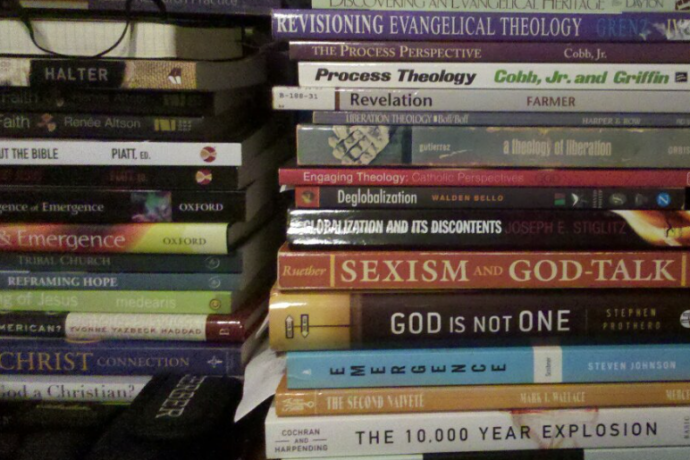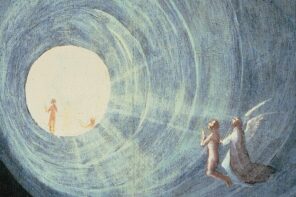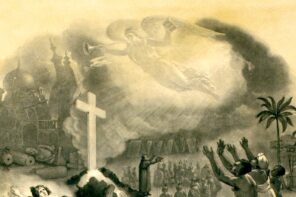What do you know about theology and where did you learn it?
Most of you will answer, “not very much,” and “at home” or “at a place of worship.” Most people don’t study theology at all in college—especially those who attend public universities and colleges.
I believe this should change.
In every corner of our public world, we find people arguing about, mobilizing, and developing politics around things theological. Theology is as much part of the world we share as race, sexuality, money, art, and literature—if we aren’t studying it in the public universities, then we are ignoring a mountain in the middle of our political and cultural landscape. And I’d argue that the public university is in a unique position to transform our by-now predictable yet intractable conflicts about religion and secular life.
So why don’t we teach theology alongside history, political science, or math?
First, theology is an historically Christian concept and discipline, and most arguments for the inclusion of theology in public education, or public affairs more generally, have tended toward Christian apologia. When we read one recent brief for “taking theology seriously in public universities,” and discover the view that “religion options should be presented [to students] as live options for living their lives,” we have to wonder which religious options are going to be the live ones. All of them?
The common default to Christianity (occasionally Judaism) with regard to theology forces us to ask: isn’t theology simply too parochial for a public university?
Next, whatever the intrinsic value of any particular theological point of view, the “public” of a public university is not a particular one. It is a broad one, shaped by plural and often conflicting religious and secular norms. It is Christian and Hindu, Muslim and Jewish, atheist and agnostic, spiritual and indifferent, and much more. It is politically divided, economically segregated, and increasingly fragmented into cultural and political islands.
Why bother with theology if it does not reflect the multipolar, globalizing, and cacophonous world that we inhabit?
And finally, the separation of secular and religious education that began in earnest in the late nineteenth century would seem to militate strongly against any consideration of theology in a publicly funded setting. Theology belongs, the argument has long been made, in seminaries and divinity schools, where it can serve principally as vocational preparation for clergy. And the law on the matter seems clear. As recently as 2004, in Locke v. Davey, the Supreme Court upheld that states have a substantial interest in preventing public funds from supporting the university training of religious professionals.
Doesn’t legal separation forbid the university from engaging this topic?
Theology Lurks, Just Out of Sight
Let’s begin with the final and fundamental issue, that of legal constraint. To be sure, theological inquiry in a public university setting could not entail the promotion of any particular theological views, Christian or otherwise, let alone prepare for professional ministry. The legislation on the issue seems quite clear, and indeed the prohibition on matters theological (in Abington School District v. Schempp, 1963) goes some way to understanding how religious studies grew and developed in our public universities in the first place.
This constraint should not be seen as a liability, however, but as an advantage for the public university. If theology is to be “public” in any way that reflects the actual public we engage, after all, it cannot merely advance the norms of one faith.
Happily public universities are already well-equipped to deal with competing and plural norms. We do it all the time, in fact, especially in the humanities and social sciences. We teach particular topics (say, Aristotelian ethics or Woolfian aesthetics or Rawlsian political theory), not in order to produce a modern Aristotle or a new To the Lighthouse, or a new Justice as Fairness. Rather, we teach them in order to jump-start discussions about values and virtues, to open students’ horizons, and to give them tools to evaluate their world in critical and measured ways. One engaged student might end up hating Aristotle; another loving him, and the same would be true for Woolf, or Rawls, or any of the other powerful and world-shaping ideas we encounter. All of these outcomes are successes.
Fundamentally, then, any theology appropriate to a public university would have to be released from Christian ownership, meaning from any Christian monopoly on the idea. Let’s provisionally imagine a new idea, then. Let’s call theology that constellation of conceptual commitments and modes of inquiry that together have enabled communities to investigate and understand the world in religious terms.
Even this loose description articulates quite differently in different traditions. Legal opinions, textual commentary, and even ritual practices can all serve as spaces of inquiry, as repositories of the imagination, as places for conducting arguments about the nature of God, and so on. Theological communities also differ, and so do the structures of authority that organize them, and both of these in dialogue with other forms of collective life.
By releasing theology from Christian ownership, notice, we open it up as a field of inquiry.
Theological reflection can hardly be captured, in this view, in the relatively small collection of foundational texts and canonical thinkers in the various traditions. It is far more than the history of doctrines or received opinions. Rather, we are asked to investigate diverse religious communities and their diverse conceptual commitments in diverse ways: in paintings, in poetry, in legal opinions, in the built environment, in ordinary practices, and more.
Learning to pay attention to these—learning how to read, for example, the novels of Marilynne Robinson, or to look carefully at the calligraphy in a mosque, or to listen with understanding to gospel music, or to engage thoughtfully with religious controversy in the public square—takes practice, creativity, and training. And the public university can teach us how to do this, with the resources of disciplines as far-ranging as anthropology, history, literature, art history, and political science, and more.
By concentrating our attention in this way, finally, we can make explicit what is now secretive—after all, theology already has a quiet presence in the public university curriculum.
Depending on your courses, you might explicitly cross paths with theological (in all senses) topics in a variety of areas, in a philosophical work or book or poem or art work that seems to call on a religious imaginary. You will also run across implicitly theological topics, topics that either have a bearing on or are historically conditioned by theological inquiry, in many disciplines as well. If you ever wonder why human rights are so important to our modern world, for example, ask the theologians.
Indeed, theology is a fraternal shadow both to the secular disciplines and the secular university itself, an absent presence in many of the questions we ask, and the answers we give. Much conflict, in fact, about religion and the university derives from the sense that theology is lurking just out of sight. If we allow ourselves to focus on it, we can confront directly what is already in our midst. Even for critics of theology, this should seem a salutary enterprise.
Two final thoughts. First, if theology is to become a matter for dynamic public reflection, then its normative and world-making aspects cannot be handed over to the faithful alone. There are signs that this is already happening, both inside the academy and outside. Whether by expanding the analytical meaning of theology, or by exploring the blurry boundaries between theologies and other ostensibly secular fields of knowledge, or simply by providing forums like this one where substantive public disputation about the theological can happen: there is a move afoot to engage theology in new and exciting ways.
By creating a robust curriculum of study, whether within or outside departments of religious studies, public universities have a chance powerfully to advance these efforts.
Second, this project offers, I believe, important opportunities for the public university in public life. What is a public university, after all, if not a place both to imagine and create new ways of living?
In terms of religion (and much else), we live in a world that rewards those who shout the loudest. New atheists shout at the devout, and the devout shout back, and the result is mostly noise. The university is one of the few places where we seek to create something different, namely, both opportunities for critique and spaces for response, both settings for arguments and the cultivation of the sympathy that makes arguments worth having in the first place.
People often bemoan the apparent irrelevance of the university—here is an opportunity to help reshape a conversation that really matters.





